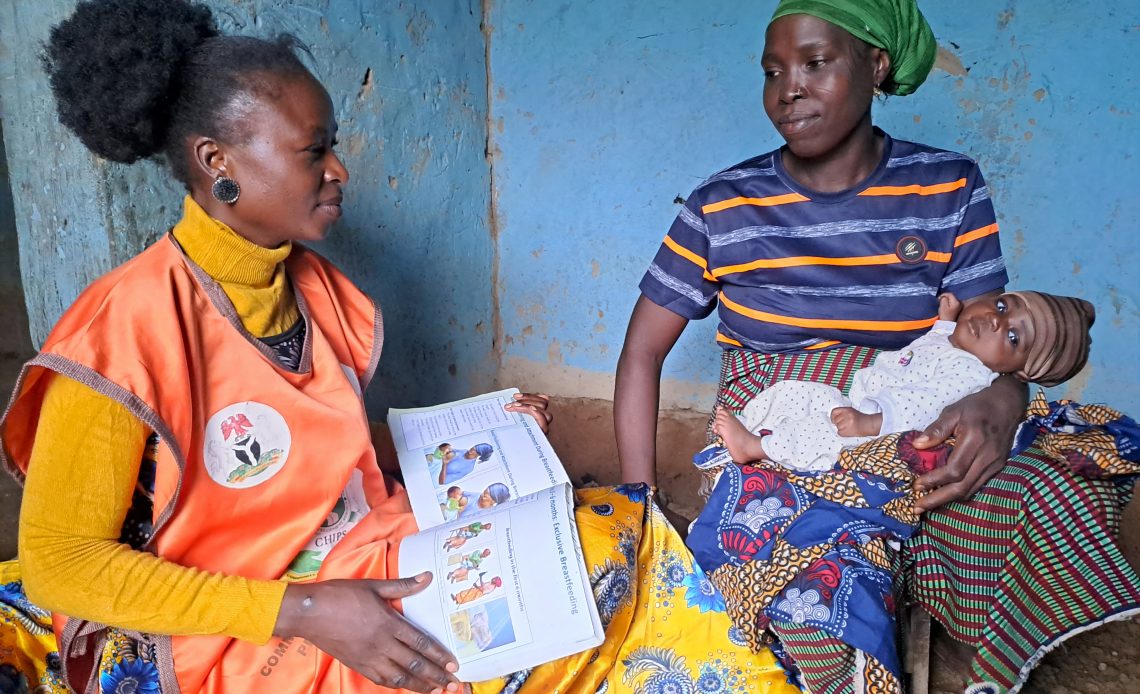Twice a month, Mary Jacob, a Community Engagement Focal Person (CEFP), conducts supportive supervision of 35-year-old Afinnaki Ibrahim, a Community Health Influencer, Promoter, and Services (CHIPS) agent in Kafin Shanu ward in Karu Local Government Area (LGA) of Nasarawa State. Jacob monitors the agent’s engagement with pregnant women and children under five, resolves non-compliance issues, and ensures quality community data capture. She is one of the 116 CEFPs and 116 community health extension workers (CHEWs), supervising and supporting 580 CHIPS agents in 52 selected wards across all 13 local government areas (LGAs) in Nasarawa State. The 52 host communities were selected based on their maternal, newborn, and child health (MNCH) indicators, accessibility, state of Primary Health Centre functionality, and ward development committee (WDC) willingness to foster grassroots support and participation, said Dr Madawa Absolum, Director of Community and Family Health Services, Nasarawa State Primary Healthcare Development Agency (NSPHCDA).
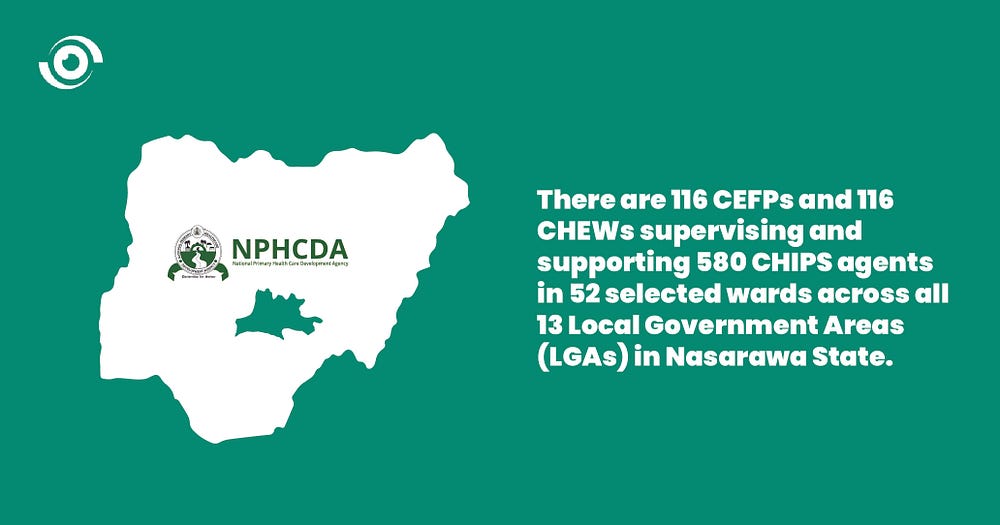
The birth of CHIPS: a paradigm shift
Launched in February 2018 in Nasarawa State, the CHIPS programme is an initiative of the National Primary Health Care Development Agency (NPHCDA) and the Federal Government of Nigeria. The aim is to reduce maternal and child morbidity and mortality by enhancing access to primary healthcare services at the community level. According to Dr Absolum, the programme harmonises existing community-based initiatives — the Village Health Workers (VCMs), Community Volunteers (CVs), and Volunteer Community Mobilisers (VCMs) — into a single programme.
According to Jane Ibanga, Lead, Communication and Demand Generation, National CHIPS Programme, spearheaded by the NPHCDA, the CHIPS programme has been implemented in 34 states including the Federal Capital Territory (FCT), with state governments committing to mirroring the strategy at the state level, including allocating funds and engaging partners for technical and financial support to ensure sustainability. In Nasarawa State, five percent of the state’s Basic Health Care Provision Fund (BHCPF) allocation is allotted monthly for the programme. In addition, the Global Fund signed a five-year Memorandum of Understanding (MoU) with the NPHCDA in 2021. This supports the incentives paid to CHIPS personnel across 24 wards within four LGAs in the State, said Dr Absolum.
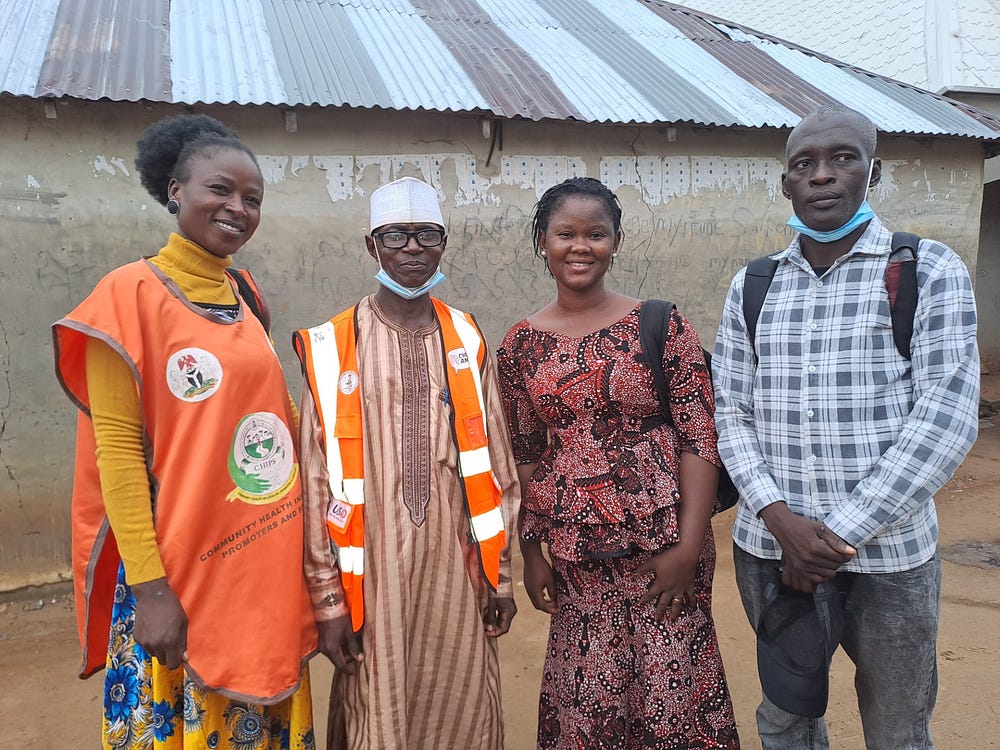
Selecting and training CHIPS agents
Nominations to become CHIPS agents were made according to NPHCDA criteria, which required the candidate to be female, at least 25 years old, a community resident with integrity, with at least a primary education and community-based work experience. All selected agents underwent a four-week training in December 2018. “It was a ‘total package’ training, combining everything we needed to know as community health influencers and promoters,” said Afinnaki.
Although the training incurred significant costs, the programme has experienced some personnel attrition. As of July 2023, there have been five deaths and 40 voluntary departures, leaving noticeable vacancies. “This gap is yet to be filled due to a lack of funding for training and the procurement of commodities,” said Jimmy Bem, the state CHIPS coordinator.
Routine home visits and follow-ups
Carrying bags containing their operations manuals, 1000-day checklist for pregnant woman and children under two years, a household register listing the households within their catchment areas and encounter registers for recording basic health services provided, two CHIPS agents, Aisha Moyi and Jennifer Samson, carry out three-day routine home visits every week in Zanwa ward, a densely populated community in Lafia LGA. They provide health promotion and prevention, and essential curative services to pregnant women and nursing mothers, including linking them to the nearest health facility and ensuring follow-up.
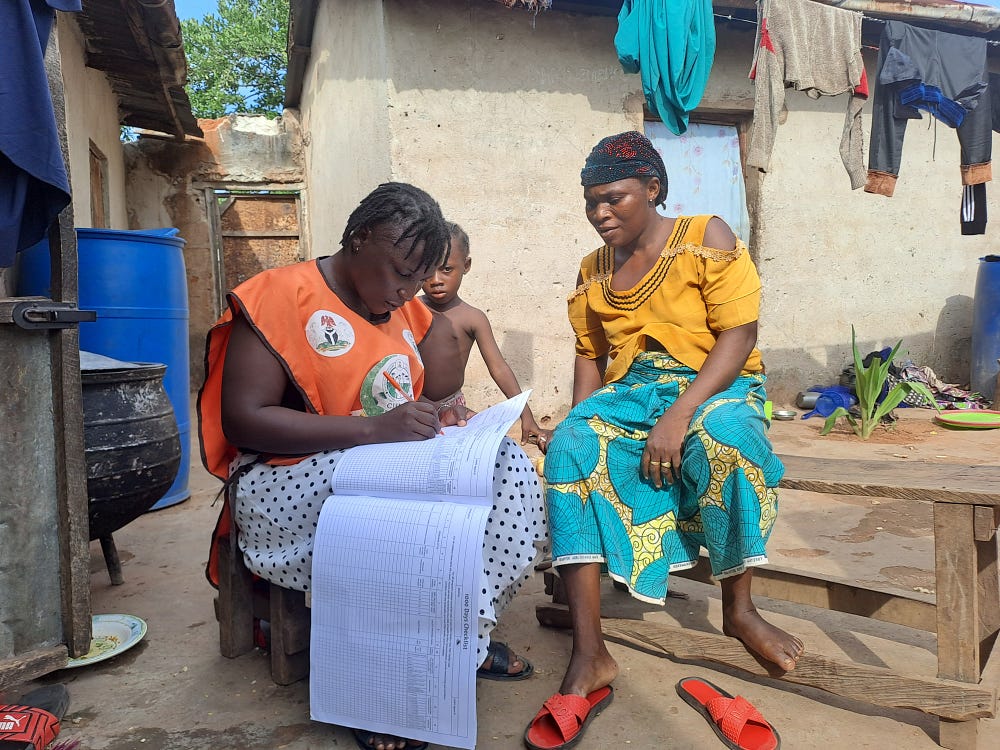
Although they complain about the weight of the bags, Aisha said she makes at least 20 referrals every weekday, and according to their CHEW supervisor, Abeka Mathew, Aisha covers 1,600 houses in four settlements. In comparison, Samson covers 2,000 homes. Her catchment area increased due to a neighbouring agent’s relocation in 2021. “The recommended number of agents per ward is ten, but in a situation like Jennifer’s, states are at liberty to deploy even 20 agents,” said Ibanga.
In the past, agents delivered commodities such as mosquito nets and medications during home visits, but the state has stopped this practice. Kasim Hussaina, who has been receiving care from Jennifer since her pregnancy, expressed her dissatisfaction with the discontinued supplies, stating, “I was not happy when they stopped bringing the nutrition supplements for my newborn and malaria drugs for my other daughter.” Hadiza Sulaiman, a mother of three who has been receiving care from Afinnaki, said “thanks to Affinaki, I delivered at the hospital for the first time. Even after the delivery, she continues to visit me, ensuring that I take my child for immunisation.”
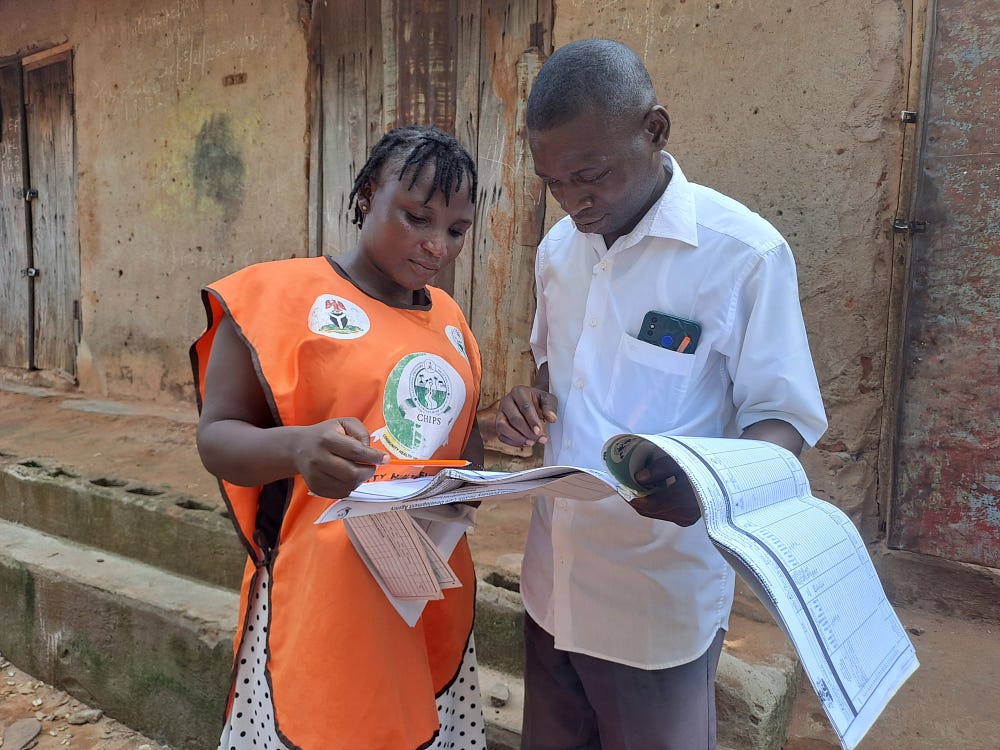
CHIPS data validation
NPHCDA requires implementing states to conduct quarterly supportive supervision to collect and validate the data collected at LGA-level. However, due to a lack of funding, this level of supportive supervision has only been conducted twice in Nasarawa State; once in 2019 and the first quarter of 2022 with support from the Saving One Million Lives Programme for Results (SOML-PforR).
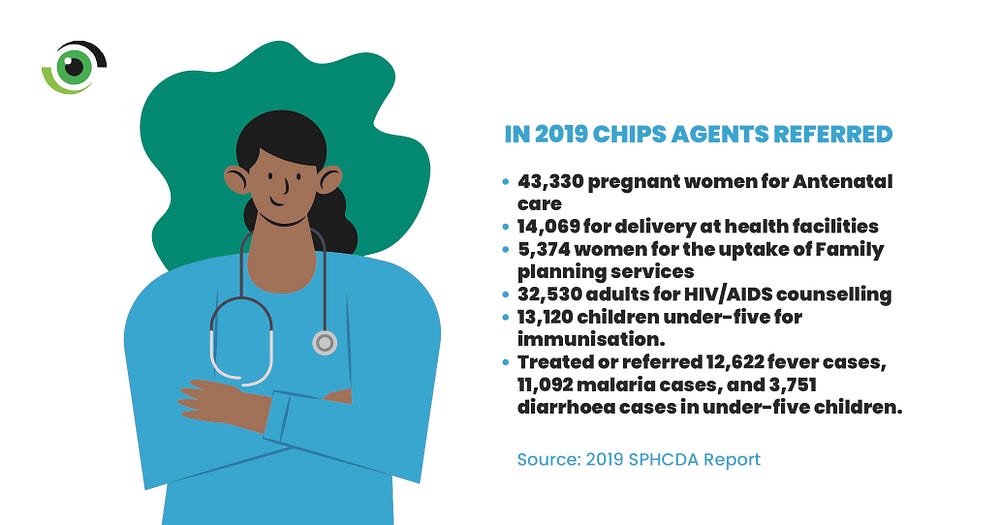
“In 2019, maternal deaths within the host communities decreased from 120 in the previous year to 90. Similarly, comparing data from 2019 to 2022 at the LGA level, it is evident that a higher number of women are accessing antenatal care (ANC) and delivery in wards, in communities where CHIPS are available, as opposed to those without,” said Bem, noting that, witnessing the CHIPS programme’s impact, partners in the state now express the intention to exclusively operate in communities with CHIPS agents.
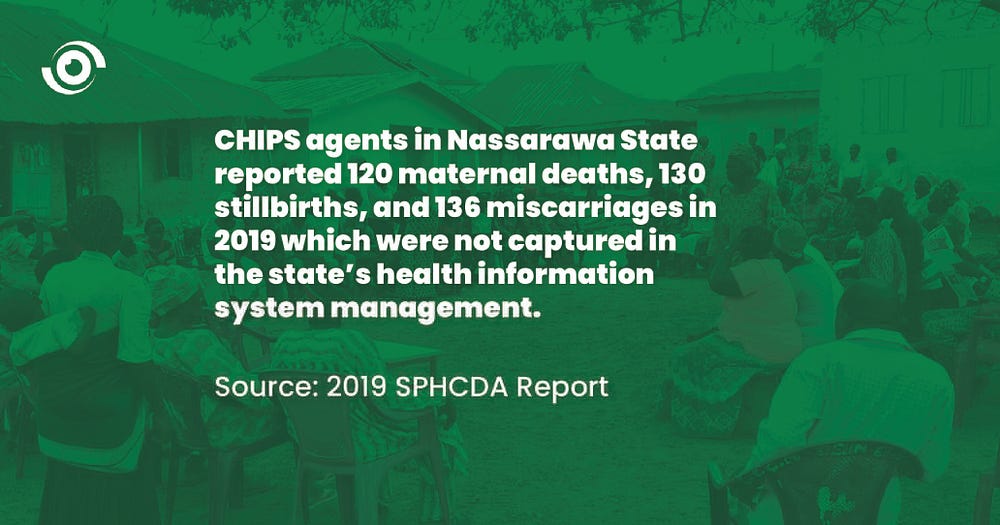
According to Bem, the validated reports indicated that use of paper-based tools for data collection is prone to entry errors in entry and may result in inaccuracies and unreliable information. To address this, the Clinton Health Access Initiative (CHAI) is collaborating with the State Primary Health Care Development Agency (SPHCDA) to develop a “community health information management” database system for the programme. Dr. Absolum noted that the implementation of this system is in its final stages. He also mentioned that the agency is advocating to the state government for the allocation of resources to facilitate the use of digital tools for data collection and seamless transfer to the database.
Dedicated funding for the programme’s sustainability
Since its inception, securing a financial commitment from the Nasarawa State government for the CHIPS programme has remained a challenge. This was evident when CHIPS agents and their supervisors went without their N5,000 and N3,000 monthly allowances, respectively, for nine months. The situation persisted until the SPHCDA utilised funds from its SOML-PforR to settle the outstanding payments. Dr. Absolum noted that despite the delay, a majority of CHIPS agents continued to fulfill their roles. “People from other states often inquire about how we maintain agents’ motivation despite unpaid work,” he said, “Our approach involves including them in campaigns such as Maternal, Newborn, and Child Health (MNCH) Week and immunisation outreach. This consistent involvement makes them feel valued and motivated.”
The resilience demonstrated by the CHIPS personnel has, in part, contributed to the programme’s significant strides in increasing healthcare demand and delivery in Nasarawa State. However, the funding challenges constitute a major threat to the agents’ commitment, as well as the programme’s long-term viability. Promises were made during their training, such as economic empowerment as a recognition of their invaluable role and support for high-performing agents to pursue further education. Regrettably, none of these promises have been fulfilled. The CHIPS personnel play a critical role in driving the programme’s success, with genuine commitment from the state government, substantial potential exists to fortify and perpetuate its impact within the state.


